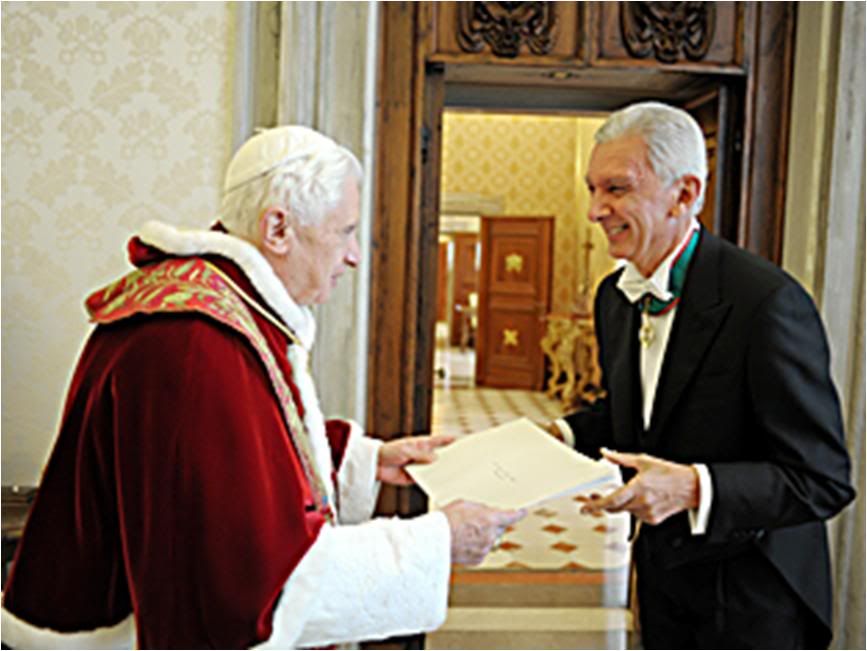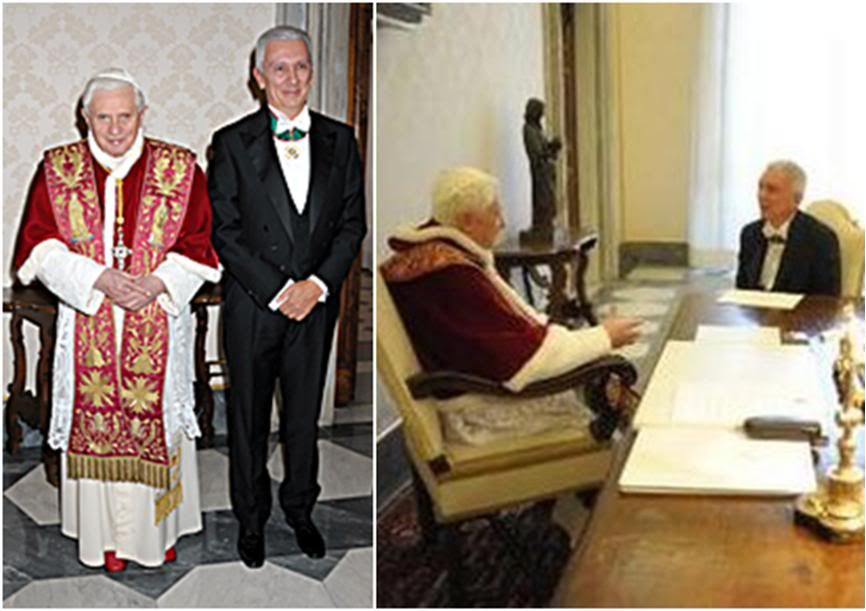
 The Holy Father interacts with the Italian ambassador to the Holy See more than with any other diplomat by the very fact that the Pope is also the Primate of Italy. The Italian ambassador is therefore always present, and usually represents the Italian government, whenever the Pope visits any place in Italy, even within Rome.
Pope receives credentials of
The Holy Father interacts with the Italian ambassador to the Holy See more than with any other diplomat by the very fact that the Pope is also the Primate of Italy. The Italian ambassador is therefore always present, and usually represents the Italian government, whenever the Pope visits any place in Italy, even within Rome.
Pope receives credentials of
new ambassador from Italy


VATICAN CITY, 17 DEC 2010 (VIS) - Benedict XVI received today the Letters of Credence of Francesco Maria Greco, the new Italian ambassador to the Holy See.
In his address to the diplomat, the Pope spoke of the preparations underway for the celebration of the 150th anniversary of Italian unity, affirming that "one of the most important aspects of the long and sometimes tiring and difficult journey which led to the modern Italian State, was the search for a just distinction between the civil and religious communities, and for correct forms of collaboration between them"....
 Here is a full translation of the Holy Father's address:
Here is a full translation of the Holy Father's address:
Mr. Ambassador,
It is my pleasure to accept the Letters with which the President of the Italian Republic accredits you as Ambassador Extraordinary and Plenipotentiary to the Holy See.
In thanking you for the noble expressions you addressed to me, my thought goes out to the Chief of State, other authorities, and all of the beloved Italian people.
I have continually had occasion to note how strong the awareness is of the special ties between the See of Peter and Italy, which find significant expression in the attention that civilian authorities have for the Successor of Peter and in the affection that the Italian people show me with such enthusiasm here in Rome and during my travels in the land, as in my recent visit to Palermo.
I wish to assure you that my prayers follow closely both happy and sad events in Italy, for whom I ask the Giver of all things good to conserve in her people the precious treasure of the Christian faith and to give them the gifts of concord and prosperity.
On this happy occasion, I extend to you, along with my heartfelt welcome, a fervent wish for success in the demanding mission that you officially take on today.
Indeed, the Embassy of Italy to the Holy See - whose prestigious seat linked to the memory of St. Carlo Borromeo I was able to visit two years ago - contitutes an important point for the relatiosnhips of intense collaboration between the Holy See and Italy, not only bilaterally but also in the more ample context of international affairs.
Moreover, the diplomatic representation of which you are assuming leadership offers a valid contribution to the development of harmonious relationships between the civilian and ecclesial communities in the land, and also lends valuable service to the diplomatic corps accredited to the Holy See.
I am certain that under your leadership, this intense activity will continue with new impetus, and even now, I express to you and your co-workers my sincere gratitude.
As you recalled, celebrations for the 150th anniversary of Italian unification have begun - an occasion for a reflection that is not just commemorative, but also in terms of projects and plans that are quite opportune in the present difficult historical phase for the nation and for the world.
I am happy that even the pastors and various components of the ecclesial community are actively involved in the re-evocation of the process of unification that began in 1861.
One of the aspects of that long, often laborious and contested journey that has led to the present physiognomy of the Italian State, consisted in the search for a correct distinction and just forms of collaboration between the civilian community and the religious - an exigency that is much more felt in a nation like Italy whose history adn culture are so profoundly marked by the Catholic Church, and in whose capital is also found the episcopal seat of the visible head of this community that is spread around the world.
These characteristics, which have been part of the historical and cultural patrimony of Italy for centuries, cannot be denied, forgotten or marginalized. The experience of these 150 years has taught us that whenever that has been attempted, it has caused dangerous imbalances and painful fractures in the social life of the nation.
In this regard, Your Excellency has recalled opportunely the importance of the Lateran Pacts and the Villa Madama Agreement which define the coordinates of a just balance of relationships that are advantageous to both the Holy See as well as the State and the Church in Italy.
Indeed, the Lateran Treaty which configured the State of Vatican City and provided for some important immunities, set the conditions that assure full sovereignty and independence for the Pontiff and the Holy See, thus safeguarding the universal mission of the Church.
In turn, the Accord that subsequently modified the Concordat aimed fundamentally to guarantee the full exercise of religious freedom, and therefore of that right which is historically and objectively the first among fundamental human rights.
It is therefore of great importance to observe, and at the same time, to develop the letter and the spirit of those agreements and those that derive from it, recalling that they have guaranteed and can still guarantee our serene coexistence with Italian society.
Those international pacts are not an expression of the desire of the Church or the Holy See to obtain power, privileges or positions of social or economic advantage, nor do they intend to restrict her only to the area that is properly that of the mission assigned by the Divine Founder to his community on earth.
On the contrary, these agreements have their basis in the correct desire by the State to guarantee to individuals and to the Church the full exercise of religious freedom, a right that does not have only a personal dimension, because "the social nature itself of the human being demands that he can express externally the internal acts of religion, communicate with others on religious matters, and profess his own religion in a communitarian way" (Conc. Vat. ii, Dich. Dignitatis humanae, 3).
Thus, religious freedom is a right, not just of the individual, but of the family, of religious groups and of the Church (cfr. ibid., 4-5.13), and the State is called on to protect not just the rights of believers to freedom of conscience and of religion, but also the legitimate role of religion and religious communities in the publis sphere.
The correct exercise and the corresponding acknowledgement of this right allow society to avail itself of the moral resources and generous activity of believers. That is why one cannot think of achieving authentic social progress by following the way of marginalizing or even explicit rejection of the religious factor, as it tends to be done in our time through various ways.
One of this is, for example, the attempt to eliminate from public places the display of religious symbols, especially the Crucifix, which is certainly the emblem par excellence of the Christian faith, but speaks at the same time to all men of good will, and as such, is not a factor for discrimination.
I wish to express my appreciation to the Italian government which, in this respect, has acted in conformity with a correct view of secularity, and in the light of her history, culture and tradition, finding positive support for this from other European nations.
While in other societies there are attempts to marginalize the religious dimension, recent news reports attest how in our day, open violations of religious freedom are being committed. In the face of this painful reality, Italian society and authorities have demonstrated a special sensitivity for the fate of those Christian minorities who, because of their faith, have suffered violence, are discriminated against, or constrained to emigrate from their homeland.
I hope that awareness of this problem may be raised everywhere, that efforts may be intensified, everywhere and for all, to realize full respect for religious freedom. I am certain that in its commitment to this end, the Holy See will not lack the support of Italy in the international scene.
Mr. Ambassador, in concluding my reflections, I wish to assure you that, in the fulfillment of the high mission entrusted to you, you may count on my supprot and that of my co-workers.
Above all, I invoke on your mission the protection of the Mother of God, who is so loved and venerated in the entire peninsula, and of the patrons of the nation, Saints Francis of Assisi and Catherine of siena. From my heart, I impart the Apostolic Blessing on you, your family, co-workers and the beloved people of Italy.
Pope appreciates Italy's
defence of crucifixes in schools

17 December 2010
VATICAN - Pope Benedict XVI said on Friday he "appreciated" the Italian government's support in defending the right to display crucifixes in public schools.
The government had acted "in conformity with a correct vision of secularism and in light of its history, culture and tradition," Benedict said during a meeting with Italian ambassador to the Vatican Francesco Maria Greco.
Italy began in June an appeal against the European Court of Human Rights' ruling in 2009 condemning the display of crucifixes in Italian schools in a case that could affect all of Europe.
"The crucifix is certainly the emblem par excellence of the Christian faith but, at the same time, it speaks to all men of goodwill and as such is not a discriminatory item," the pontiff said.
"It's not possible to think of achieving authentic social progress by taking the path of marginalisation or even explicitly rejecting religion," said the pope, who often urges Europe to "reconcile itself" to its own Christian roots.
In a message on religious freedom on Thursday, Benedict accused Western countries of "sophisticated forms of hostility to religion," such as "a denial of history and the rejection of religious symbols."
Catholicism was the state religion in Italy until 1984, and a 1920s ruling ordering the presence of crucifixes in schools was never abolished.
The European court's final ruling, due in several months, could be applicable to schools in all the Council of Europe's 47 member states.
Italy is backed in the appeal by a dozen other countries that include Armenia, Bulgaria, Cyprus, Greece, Lithuania, Malta and Russia.
[Modificato da TERESA BENEDETTA 18/12/2010 10:28]